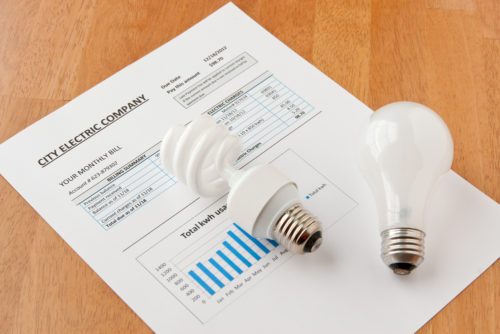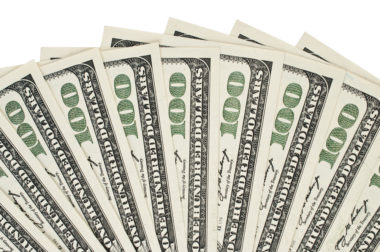When you hear the term “going green,” it may make you think of complicated solar panel systems or oversized rainwater barrels. You may assume you can’t go green while staying frugal. However, there are small ways you can make your household more energy efficient. There are countless environmentally friendly habits you can take on that don’t involve installing expensive equipment.
According to the U.S. Department of Energy, households that seal uncontrolled air leaks save an average of $83 to $166 each year. By using a power strip for multiple electronic devices and turning it off when not in use, you can save an average of $100 annually. Implementing tiny environmental changes in your home and life can lead to big savings, which is useful if you’re on a tight budget.
Table of Contents
How to Go Green At Home
Reduce Energy Use
When you reduce the energy you use, you also reduce your power bill. By simply ensuring you turn lights off when you leave the room, you can reduce the energy your household consumes. Try turning your water heater temperature down by a few degrees. If possible, set your thermostat higher by a few degrees in the summer and lower by a few in the winter.
Reduce Water Use
Restricting the amount of water used in your home helps to lower your water bill. If you use lawn sprinklers, consider cutting down on the time or frequency you water your lawn. Encourage all family members to take shorter showers and turn the faucet off when brushing their teeth. Fill your sink with water to wash dishes instead of leaving it running. Ensure you don’t have any leaky faucets and if so, try to make these home repairs yourself.
Low Water Gardening
If you’re on a budget, another way to reduce your water usage is by low water gardening. Choose landscaping for your yard that doesn’t require constant watering. Keeping it minimal can ensure you don’t need to run your sprinklers or water your garden constantly.
Native Plants
Planting a garden is a great way to ensure you can eat healthy on a budget. However, it’s important to do your research and stick with native plants that don’t require a lot of maintenance. When planting, also think about sunlight and shade. Plant large bushes or trees in the right spaces so they can help shade your plants that don’t need full sunlight.
Composting
You can help reduce trash by composting. Composting bins are inexpensive or you can make your own compost pile. By putting your scraps in a composting bin, you’re eliminating the energy and space it takes to place these items in the landfill. Your organic trash can easily be composted, such as banana peels or other food scraps.
Going Green When Shopping
Avoid Idling Your Car
When you idle your car, you’re wasting gas and letting emissions continue to seep into the air needlessly. If you’re waiting in a parking lot or stuck in traffic for a while, turn your car off. You’ll save gas and help improve the air quality around you.
Budget Your Spending to Needs Only
Create a shopping list and stick to it. By staying on budget, you’ll not only save money, but you’ll help the environment. When you buy food you don’t use and it goes bad, you’re wasting the resources that were used to create the food. The more consumer goods you purchase, such as clothing and shoes, the more goods are produced, which is another strain on the world’s resources.
Thrift Shop
Since the production of clothing, shoes, and other consumer goods uses water, energy, and important resources, reusing these items is a great way to prevent this drain. By thrift shopping for your clothes and other goods, you’re reusing resources instead of increasing the demand for additional goods to be produced. You can also find some great deals at thrift stores.
Purchase Recycled Products
When you go shopping, you usually have several brand choices. Whether you’re buying paper products, reusable containers, or other items for your household, whenever possible, choose products that are made from recycled goods. If you’re shopping for food, choose brands that package their items in recycled containers. This helps eliminate the production of new plastics and other harmful materials.
Join a Credit Union
Unlike big banks or other financial institutions, credit unions use your money for local community initiatives. When you bank with a credit union, your money may be used for park cleanups or road improvements. Credit unions also usually offer many resources to keep you financially healthy and working toward your goals.
Pick a Greener Commute
Ride a Bike or Walk
Cars emit harmful emissions into the atmosphere, which may be what’s contributing to climate change. If you’re close enough to your office to bike or walk to work, give it a try. Not only will you skip out on contributing to poor air quality, you’ll also save money on gas or transportation fare. A nice walk or bike ride each day can keep you healthy and boost your mood.
Use Public Transit
If your job is a little too far to bike or walk your commute, consider public transportation in your area. Riding a bus or train is just like participating in a large carpool, which saves money and the environment. Transportation fare is generally less expensive than the gas you’ll burn fighting traffic in your car every morning and evening.
If you’re on a budget, implementing small ways to make your household more green can help you save money. If you remain environmentally conscious and make these tiny changes to your lifestyle, home, and shopping techniques, you can stay on a tight budget while doing good for the world.
Image Source: https://depositphotos.com/





